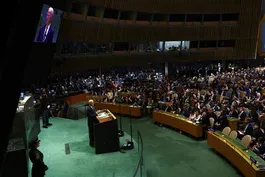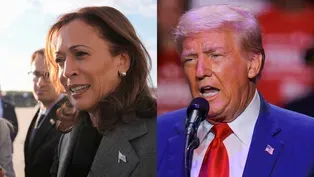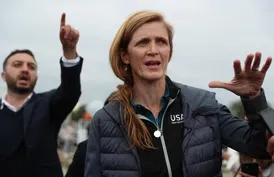
Lawmakers grill CEO over steep prices for weight loss drugs
Clip: 9/24/2024 | 3m 57sVideo has Closed Captions
Lawmakers challenge drug company CEO over steep prices for Ozempic and Wegovy
Ozempic and Wegovy are some of the most popular drugs in the country, driven by their remarkable success in treating diabetes and obesity. But the drugs are extremely expensive, and the drugmaker’s CEO appeared on Capitol Hill Tuesday to face questions about why those prices are so high. William Brangham reports.
Problems with Closed Captions? Closed Captioning Feedback
Problems with Closed Captions? Closed Captioning Feedback
Major corporate funding for the PBS News Hour is provided by BDO, BNSF, Consumer Cellular, American Cruise Lines, and Raymond James. Funding for the PBS NewsHour Weekend is provided by...

Lawmakers grill CEO over steep prices for weight loss drugs
Clip: 9/24/2024 | 3m 57sVideo has Closed Captions
Ozempic and Wegovy are some of the most popular drugs in the country, driven by their remarkable success in treating diabetes and obesity. But the drugs are extremely expensive, and the drugmaker’s CEO appeared on Capitol Hill Tuesday to face questions about why those prices are so high. William Brangham reports.
Problems with Closed Captions? Closed Captioning Feedback
How to Watch PBS News Hour
PBS News Hour is available to stream on pbs.org and the free PBS App, available on iPhone, Apple TV, Android TV, Android smartphones, Amazon Fire TV, Amazon Fire Tablet, Roku, Samsung Smart TV, and Vizio.
Providing Support for PBS.org
Learn Moreabout PBS online sponsorshipGEOFF BENNETT: Ozempic and Wegovy Wegovy are some of the most popular drugs in the country, driven by their remarkable success treating diabetes and obesity.
But the drugs are extremely expensive, and the drugmaker's CEO appeared on Capitol Hill today to face questions about why those prices are so high.
William Brangham reports.
SEN. BERNIE SANDERS (I-VT): What we are dealing with today is not just an issue of economics.
WILLIAM BRANGHAM: At a Senate Health Committee hearing, Chairman Bernie Sanders, independent of Vermont, pressed the CEO of Novo Nordisk about why Americans pay so much more for the same drugs compared to other nations.
SEN. BERNIE SANDERS: The net price for Ozempic is still nearly $600, over nine times as much as it costs in Germany.
And the estimated net price of Wegovy is over $800, nearly 4.5 times as much as it costs in Denmark.
WILLIAM BRANGHAM: CEO Lars Jorgensen defended his Danish firm, pointing the finger for high costs principally at the U.S. health care system.
LARS JORGENSEN, CEO, Novo Nordisk: We don't decide the price for patients.
And that's set by the insurance companies.
WILLIAM BRANGHAM: He specifically blamed what are known as pharmacy benefit managers, or PBMs.
They act as third-party middlemen between drug companies on one side and insurers, pharmacies and hospitals on the other, often determining which drugs get covered and at what prices.
LARS JORGENSEN: Insurance companies and PBMs, the big conglomerate, have more than doubled, actually close to tripled their profits.
WILLIAM BRANGHAM: Jorgensen argued those prices are high because Novo Nordisk has to pay the PBMs' rebates to ensure his drugs are covered.
More expensive drugs lead to higher rebates.
But Sanders said he'd receive pledges from major PBMs that would change that equation.
SEN. BERNIE SANDERS: We have in writing, we will certainly share it with you, commitments from the three major PBMs that, if you substantially lower your list price, they would not limit coverage.
Will you work with this committee and the PBMs?
LARS JORGENSEN: If it works in a way where patients get access to a more affordable medicine.
WILLIAM BRANGHAM: Republican Roger Marshall of Kansas echoed the point that PBMs should be the focus.
SEN. ROGER MARSHALL (R-KS): Novo Nordisk is not the villain in this story.
They're a hero.
We should be here celebrating this miracle innovation.
WILLIAM BRANGHAM: Fellow Republican Bill Cassidy of Louisiana: SEN. BILL CASSIDY (R-LA): We still have to preserve the profit incentive for the creativity for drug companies to invest in order to develop the drugs that are going to affect, that are going to positively affect the burden of disease in our society.
That is the tension.
WILLIAM BRANGHAM: The hearing comes at the same time a new government study finds that, in the last 10 years, the U.S. obesity rate remained largely unchanged at about 40 percent and that severe obesity rose slightly in the last decade.
LARS JORGENSEN: And we talk about the cost of the medicine, but it's really the cost of the diseases that's breaking the system.
WILLIAM BRANGHAM: Jorgensen told senators that the price of Ozempic and Wegovy pales in comparison to the hundreds of billions that diabetes and obesity cost the U.S. every year.
LARS JORGENSEN: These are very, very expensive diseases.
And we talk about the cost of the medicine, but typically, in these diseases, the cost of the medicine is less than 10 percent of the total disease burden.
WILLIAM BRANGHAM: Experts predict that one or both drugs may be involved in the next round of Medicare price negotiations.
For the "PBS News Hour," I'm William Brangham.
At UN, Biden urges leaders to work for peace
Video has Closed Captions
At UN, Biden urges leaders to work for peace as Israeli, Hezbollah fighting intensifies (9m 3s)
Book offers new look at forces behind Emmett Till's murder
Video has Closed Captions
New book 'The Barn' revisits the people and forces behind Emmett Till's murder (6m 40s)
Families of veterans face growing toll in providing care
Video has Closed Captions
Families of veterans face growing emotional and financial toll in providing care (5m 41s)
Rock legend Nick Lowe on his first new album in a decade
Video has Closed Captions
Musician Nick Lowe on his legendary career and first new album in a decade (6m 58s)
Trump, Harris push economic proposals on campaign trail
Video has Closed Captions
Trump vows to lure foreign companies to U.S. as Harris pushes affordable housing plan (2m 27s)
USAID chief: Civilians will pay the price if war expands
Video has Closed Captions
'It will only be civilians who pay the price' if Middle East war expands, USAID chief says (9m 45s)
Providing Support for PBS.org
Learn Moreabout PBS online sponsorshipSupport for PBS provided by:
Major corporate funding for the PBS News Hour is provided by BDO, BNSF, Consumer Cellular, American Cruise Lines, and Raymond James. Funding for the PBS NewsHour Weekend is provided by...

















